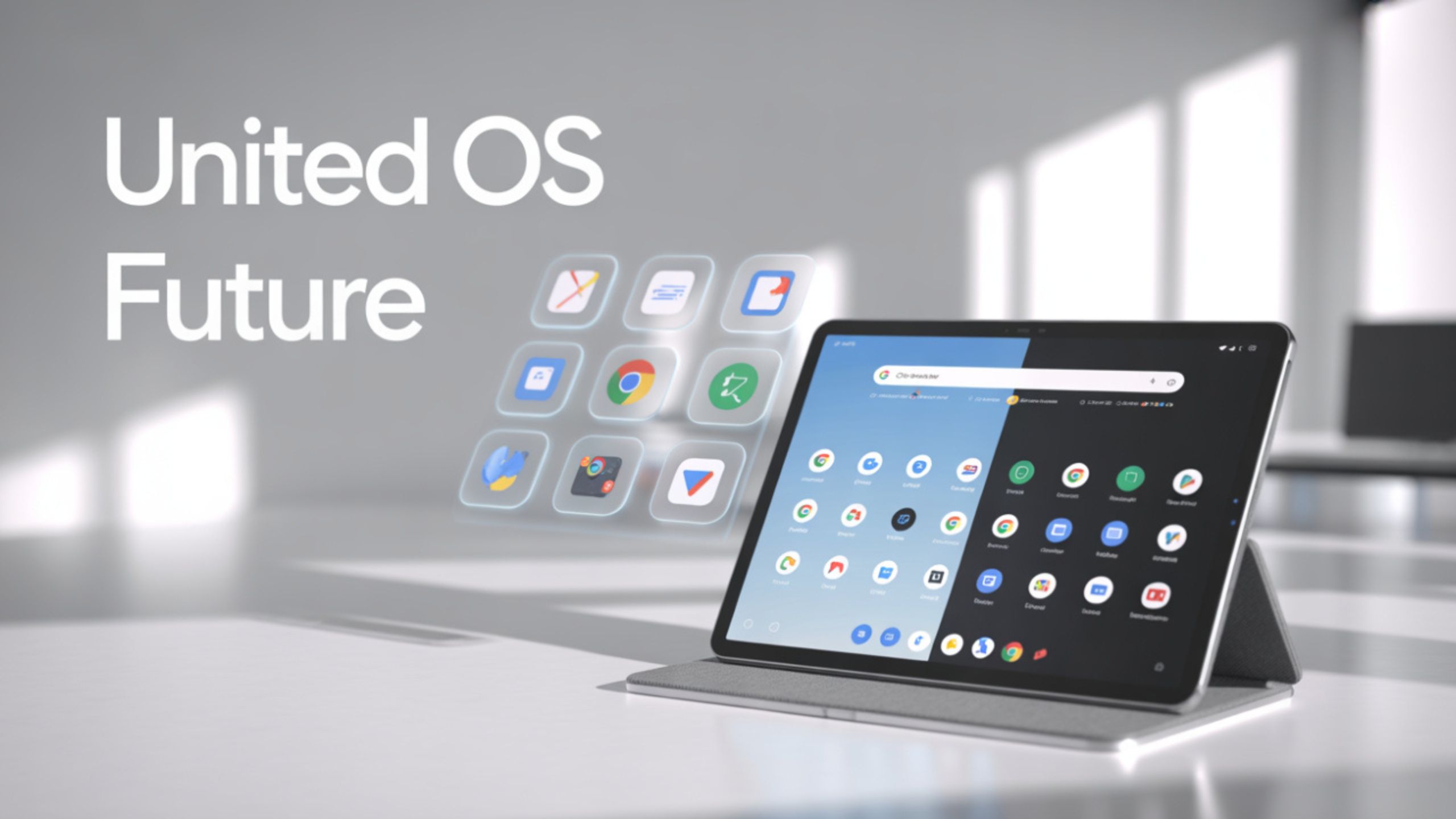Chrome OS and Android OS Merger Officially Coming– In a historic shift for the Android and Chrome OS ecosystems, Google is officially working to merge Chrome OS into Android, reshaping the future of mobile and desktop computing. What was once speculation has now been confirmed by Sameer Samat, President of the Android Ecosystem at Google. Unifying these two operating systems signals a bold step toward an integrated, seamless, and more versatile user experience across devices.
The Confirmation: A Glimpse Into Google’s Strategy
During an interaction with TechRadar, Sameer Samat sparked a major revelation when he asked why a journalist was using Apple products—an Apple Watch, iPhone, and MacBook. His follow-up provided the bombshell:
“I asked because we’re going to be combining Chrome OS and Android into a single platform…”
This marks Google’s first public acknowledgement of its ambitions to unify Chrome OS and Android. The implications are profound. Instead of building a third platform from scratch, Google plans to migrate Chrome OS into Android, streamlining development, support, and ecosystem expansion.
Chrome OS into Android: Not a Hybrid, But a Migration
Unlike the failed “Fuchsia” or the long-rumoured “Andromeda” project, this isn’t a speculative third OS. Instead, Google intends to fold the functionalities of Chrome OS into Android itself. This approach allows the tech giant to leverage Android’s massive user base while enhancing it with desktop-centric features that Chromebook users have come to rely on.
This migration will enable Android to become a universal OS—from smartphones and tablets to laptops and possibly desktops—backed by a rich app ecosystem and supported by ARM and x86 architectures.
Android’s Desktop Evolution: A Foundation for the Merger
Over the past two years, Android has been quietly evolving. Google has introduced several features to make Android more suitable for larger displays and multitasking environments. Among these enhancements:
- Desktop Mode: Allows users to experience Android in a windowed, PC-like interface.
- Window Resizing: Apps can now be resized like traditional desktop apps.
- External Display Management: Support for multiple monitors and better screen output control.
- Improved Taskbar & Multitasking: Tablet and desktop modes now include robust multitasking interfaces.
- Adaptive UI: Android 12L and beyond have focused on making apps scalable across various screen sizes.
These features are laying the technical groundwork for replacing Chrome OS with Android on Chromebooks and other form factors.
User Behavior at the Center of Google’s Strategy
Samat’s questioning of Apple device usage reflects Google’s user-centric approach. The company is actively researching how people use their devices—especially laptops—to shape this unified platform. The goal: Create a device-agnostic operating system that adapts to individual workflows, whether for work, education, or entertainment.
Google is reportedly gathering data on:
- Cross-device workflows (how users switch between phones, tablets, and laptops)
- Application preferences
- Cloud vs. local storage habits
- Peripheral usage (keyboards, mice, docks, etc.)
This intelligence will be critical in building a future-proof system that meets modern digital lifestyle demands.
What This Means for Chromebooks
The big question is how this migration will impact existing Chromebooks. Chromebooks run a lightweight Linux-based OS with Android app support via a containerized layer. Merging with Android will likely reverse that relationship—Android becomes the base OS, with Chrome features (like the browser and web apps) integrated natively.
Potential Benefits:
- Faster App Performance (no container overhead)
- One Unified App Store
- Improved Gaming Support via Play Games
- Deeper Google Assistant and AI Integration
- Access to Android’s Broad Peripheral Ecosystem
Potential Challenges:
- Hardware Compatibility: Older Chromebooks may not meet the technical requirements of full Android OS functionality.
- Update Cycle Shifts: Chrome OS currently benefits from an enterprise-grade update cycle, while Android updates have historically been fragmented.
- Enterprise and Education Support: Google must ensure management tools (like Admin Console, Family Link) work seamlessly post-transition.
Developer Impact: Unified App Development
For developers, this merger simplifies and expands opportunities. Currently, app creators often face fragmentation between Chrome OS and Android. With the unification:
- Single Codebase for All Devices
- Less Redundant Optimization
- Consistent UI/UX Across Devices
- Broader User Base with Desktop Access
- Improved Monetisation Options
Google’s Jetpack Compose and Material Design 3 are already pushing toward scalable, adaptable designs. This merger will likely accelerate developer adoption of responsive UIs and multi-window support.
Competitor Landscape: Targeting Apple and Microsoft
This move is also a direct challenge to Apple’s seamless ecosystem and Microsoft’s desktop dominance. Apple users benefit from tight integration across macOS, iOS, and iPadOS. With the merger, Google hopes to offer:
- Cross-device continuity
- Shared clipboard and file systems
- Better notification and message syncing
- App continuity across phone and laptop
In other words, the Android-Chrome OS merger is Google’s answer to macOS + iOS continuity and Windows’ flexible form-factor support.
User Reactions: Mixed But Hopeful
When this initiative was first rumoured, polls revealed a divided audience:
- 48% supported the merger, expecting better performance and unified app experiences.
- 32% sceptical and concerned about update delays and higher hardware requirements.
- 20% remained undecided, and more details were awaited from Google.
The success of this initiative will depend on Google’s ability to address legacy hardware, maintain its security-first posture, and ensure backwards compatibility for education and enterprise users.
What’s Next: Timeline and Expectations
While an official release date has not been shared, sources indicate that developer previews or beta releases could begin in late 2025, with commercial hardware arriving in 2026. Expect:
- OEM announcements at major events like CES or I/O
- Developer guidelines for adapting Android apps for large-screen devices
- Migration tools for Chrome OS users and administrators
- New Pixel-branded hardware showcasing the merged platform
Google’s bold vision aims to redefine the computing landscape, positioning Android as a true cross-device powerhouse that can rival macOS, iPadOS, and Windows in one unified package.

Selva Ganesh is a Computer Science Engineer, Android Developer, and Tech Enthusiast. As the Chief Editor of this blog, he brings over 10 years of experience in Android development and professional blogging. He has completed multiple courses under the Google News Initiative, enhancing his expertise in digital journalism and content accuracy. Selva also manages Android Infotech, a globally recognized platform known for its practical, solution-focused articles that help users resolve Android-related issues.




Looking forward to the new features this merger will bring!
Android apps running natively on Chromebooks is going to be awesome.
I’ve been waiting for this integration for years, finally here!
Cross-platform syncing will be easier than ever before.
Unified computing sounds like a game changer in productivity.
Wonder how this will affect developers and software updates.
This might redefine how we think about mobile and desktop OS.
This merger will really streamline user experience across devices.
Seamless transition between devices will boost user convenience.
Exciting times ahead for Chrome OS and Android users alike!
Hope the merger enhances app compatibility and performance.